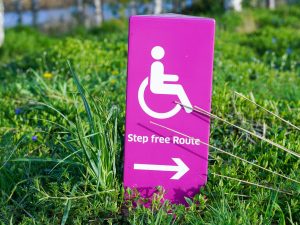By Caroline McKenzie
Moving to uni can be lots of change for anybody. When you’re also living with a disability or a medical condition, getting through each day, let alone being able to study can be a challenge.
I’ve just finished my first year studying biochemistry and living and learning with physical disability has often been hard! I thought I’d share a few things that have helped, and so here are my practical top tips for starting university for those living with disability/long term medical condition.

Get a Support Plan
A Student Support Plan (SSP) looks at all aspects of learning and possible adaptations that you may need, you get these from Student Wellbeing. Meet up with your disability advisor as soon as possible, the sooner you get this in place the sooner adaptions can be made. They will be aware of things you can utilise that perhaps you didn’t realise- for me that included creating a Personal Evacuation Plan (PEP) for when there were fire alarms!
Incidentally, lab technician Alison Gregory who oversees the PEP is a great person to get in contact with if you have queries regarding lab work. She ensures that any adaptions or adjustments needed are put in place.
Get any financial/equipment support on offer
If you haven’t already done so apply for Disabled Students Allowance (DA). Applications can be long and arduous tasks, but for me it was so worth it as I was provided with equipment enabling me to study. Again, the sooner this is done the sooner the equipment can be provided.
Have a social life
Make sure you put time and energy aside for doing things you enjoy (emphatically endorsed by Dr’s Lawry and Parry).

For me the first few weeks of university just felt like meeting after meeting, and actually it’s often important to prioritise fun things over practical things, to get to know other people and to let off steam.
Although pubs, clubs and restaurants are sometimes inaccessible, there are plenty that are, and I would encourage you to speak up and mention any access needs you have when friends are discussing where to go out.

I’ve found that people are often so willing to change plans to include my needs, it just required me to speak up and make clear what my needs were. (Local accessible pubs include The Hancock, The Junction and Spoons- sometimes you have to go round the back!)
Find support from people who have been where you are
Get involved in a society that can support your specific needs (for me this was DanSoc – Disability and Neurodiversity Society.) Through this society members are able to share experiences, get advice, raise awareness and socialise and they highlight events which may be useful for you.

Several times last year I contacted the president of DanSoc when there were issues I wanted to raise. This year the president is Georgia Corbett who is also the disabilities officer for the students’ union. She is an advocate for students with disabilities, so don’t hesitate to get in contact with her.
Speak up
Get to know your tutor. If they get to know you they can better understand what you need so it’s great to chat things through with them. They will also be able to signpost you to pertinent contacts if you have any particular issues.

If you have any worries or concerns then make sure you let the School or Course / EDI Reps know, they are there to support you. You may be the first person that they have come across with your particular needs, so unless you make the school aware, they won’t know how best to support you. Building relationships with staff members has definitely helped me to feel comfortable to raise issues as they arise and work together to form a solution.
I hope you find some of those tips helpful! This is by no means an exhaustive list, I’m sure there are many other things that students have found helpful when starting out university whilst living with disability (feel free to comment on the blog!).
Life isn’t always easy, yet that doesn’t mean we can’t enjoy studying, socialising, and getting involved in student life!

Very practical and useful. Great positive approach.